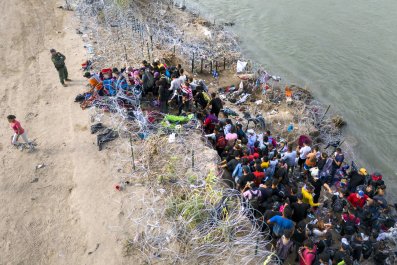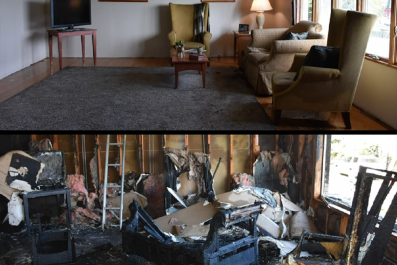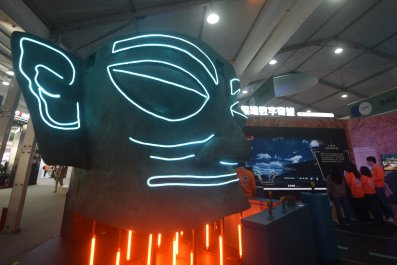Some people know Vince Vargas as Gilly Lopez, a war veteran in FX's series Mayans M.C. In fact, Vargas is a real-life veteran. He served in the U.S. Army 2nd Battalion, 75th Ranger Regiment and on the U.S. Border Patrol and was able to "leverage" his "past experiences in the military and border control" to flesh out his character. His new book, Borderline: Defending the Homefront (St. Martin's) reveals inside details about the challenges he faced as a Border Patrol Agent, including the affecting story of trying—and failing—to rescue an immigrant who drowned crossing the Rio Grande. As policy surrounding immigration and the U.S.-Mexico border continues to be a major source of contention, and in light of the infiltration of Israel's southern border with Gaza in October, Vargas talks with Newsweek about his takeaways as a border agent and what he thinks is the best way to handle border security in the U.S. In this Q&A, Vargas talks about his grandmother, who came to this country as in illegal immigrant, government policy, lessons we can learn from Israel and more.

Q_You were a U.S. border patrol agent. How did your experiences affect your views of border patrol policy and its priorities?
A _ Border Patrol agents have a diverse range of responsibilities beyond enforcement, focusing on the safety and well-being of individuals encountered at the border. My firsthand experience only strengthened my belief in the border patrol's vital role. They handle complex tasks, including immigration enforcement, drug interdiction and humanitarian concerns, all while navigating diverse landscapes. Their dedication and adaptability are impressive, making them a crucial agency for national security and well-being.

Your grandmother was an illegal immigrant. Is that complicated for you?
Individuals who arrive here through unconventional means have the opportunity to legally adjust their status, a path chosen by millions of people, much like my grandparents. It's crucial to acknowledge that while our family's legacy shapes who we are, it doesn't exclusively define us.
Last month President Biden announced the extension of Temporary Protected Status to almost 475,000 Venezuelan migrants, allowing them to live and work in the U.S. Do you think this incentivizes asylum seekers to try to enter the U.S. illegally?
It does, and I believe this is the root cause of the massive influx of illegal immigration at the border currently—an issue that our current government isn't equipped to handle efficiently.
Chief of Border Control Jason Owens said in a recent interview on ABC News that criminals are flooding the border with immigrants as a "distraction" while they smuggle in illegal goods, as well as "criminals and gang members [and] convicted sexual predators." What's your take on this?
I believe the Chief is correct, the cartels and smugglers exploit vulnerable people for profit and use them as distractions to overwhelm Border Patrol agents while carrying out drug smuggling operations.
Passions about illegal immigration run high. Some characterize it as a security issue. Other people talk about freedom and opportunity. What do you think?
It is essential for both sides to collaborate in solving problems rather than working against each other to win the argument of the day. Security and freedom are not mutually exclusive, and Americans deserve a country where both are carefully considered. It is crucial for more people to become actively involved in encouraging our elected leaders to cooperate and work together. We must inform and unite our population rather than further dividing it.
You put your combat skills to use as Gilly Lopez, an MMA fighter in FX's Mayans M.C. How has your experience helped your new acting career?
I ventured into the entertainment industry with aspirations of becoming a writer and showrunner, and my initial step into this world was as an actor. Leveraging my past experiences in the military and border patrol, I discovered a wellspring of inspiration for shaping the character Gilly. Drawing upon my background as a veteran and my exposure to drug smuggling, I was able to infuse my own life experiences into the character's development.My ultimate goal is to produce a television series that brings to light the intricacies and challenges faced by the Border Patrol.
The Hamas attack on Israel on October 7 highlights the risks of terror attacks across borders, even in a fortified border like the one penetrated in Israel. Does this have implications for U.S. border patrol?
The events in Israel highlight the importance of a robust border security system without any single point of failure, but also highlighting the need for a layered approach when it comes to well-trained people, dissemination of intelligence and good communication.
All the factors must be in place for the system to work and reliance on only one of these layers can prove to be catastrophic. Hence the wall isn't enough. Technology isn't enough. More manpower isn't enough. All these things need to be invested in and managed simultaneously to preserve the integrity of the system.
More than anything, complacency can't be allowed to creep in, and we can never get too comfortable because as we've seen, there are people and organizations working against us whose interests don't align with ours. This isn't fear mongering, this is just reality. We must remain vigilant and humane at the same time.

Do you think the U.S. border currently has enough of the layered approach you suggest? What bad actors do we need to fear the most who might seek to take advantage of any of our weaknesses?
The Border Patrol employs a highly intricate approach to border security and apprehension. Presently, our primary weaknesses lie within our existing policies, particularly those governing post-apprehension procedures.
While we are making strides in harnessing technology, manpower and enforcement capabilities, there remains an ongoing need for continuous evolution and adaptation. Our adversaries are constantly evolving, demanding that we do the same.
Currently, our system is severely strained, with the most vulnerable security aspect being the "Notice to Appear" phase of our current process. With millions of undocumented immigrants unaccounted for, the sheer volume increases the likelihood of outliers among these groups, potentially individuals with agendas beyond seeking opportunities in our nation.
We face a myriad of adversaries, ranging from smuggling organizations and drug cartels to terrorist groups, all actively seeking to exploit our vulnerabilities.









